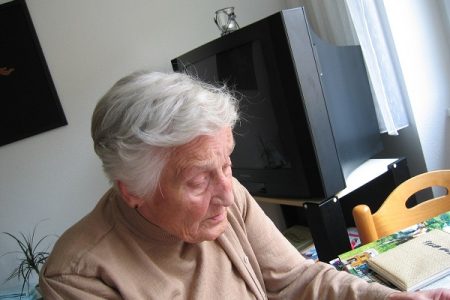
Alzheimer’s is a progressive neurodegenerative disease. Therefore, the signs and symptoms progress slowly and get worse over a time period. The disease commonly occurs in 60s and shows a wide range of mental, behavioural and social impairments in a person. Early signs may vary depending upon intensity and its duration. The symptoms are sometimes confused with other old age conditions and may get unnoticed.
The rates of occurrence of the symptoms vary from person to person. This sometimes makes it difficult to depict when the symptoms get worse in a person. Infections, medications, strokes or delirium are seen responsible for getting the symptoms worse in some cases.
Generally, memory loss is an early sign of Alzheimer’s. Although, memory loss is the early sign, it is not the only deciding factor for the disease. In many people, decline in non-memory aspects of cognition, such as impaired vision, judgement, reasoning, word completing etc may be the early signs. According to Raj C. Shah, MD of the Rush Memory Clinic, Rush university Medical Centre in Chicago, only one symptom alone does not necessarily indicate AD or dementia in a person. Dementia is the loss of cognition, usually affecting memory, and Alzheimer’s causes 50-80% of dementia cases.
Mild forgetfulness can be a normal part of ageing but if it affects day to day life of a person, it may be unusual and should be diagnosed for dementia or AD. Many other causes of memory loss may include vitamin B12 deficiency or brain, kidney, or thyroid disorders. Therefore, a proper diagnosis and recognition of the signs are important to declare a person suffering with AD or dementia. There are more than 5 million people in the US affected with AD. Although this disease is known to affect adults of 65 years and above, but there are up to 5% of these people who are identified with early-onset Alzheimer’s. In case of an early-onset Alzheimer’s, a person is diagnosed in his 40s and 50s. It is difficult to obtain true diagnosis in early stages as symptoms may appear similar to those due to typical life events such as stress. The disease affects brain, causes a decline in your memory, reasoning, and thinking ability slowly. The effects vary from person to person.
Various early signs and symptoms of Alzheimer’s which can help identify and diagnose it properly are:
Memory loss: It is the earliest sign of cognition loss in a person like forgetting someone’s name, birthdays and faces, family members and familiar places. Mild forgetfulness is a normal part of ageing or due to anxiety, stress and depression which can be related to dementia in older people, but serious memory loss and confusion is not normal. Memory loss is not consistent in people with AD as they may forget name on a day and then recall it again. Nothing is certainly predictable in dementia and Alzheimer’s.
Challenge in Planning and problem solving: AD progression may lead you or your loved ones to many troubles especially in planning and working with numbers. The problems which you may face due to developing of the Alzheimer’s are:
- Difficulty in developing plans and sticking to them
- Trouble following familiar recipe
- Difficulty in concentration on tasks and doing things for a longer time
- Trouble in keeping a track of bills, simple calculations, and in puzzle solving
Confusion of time and place: People with AD at early stages may face varying degree of confusion with time tracking and place recognition. These confusions are:
- The real issue of people with AD is perception of time. For them, 5minutes may be equal to 5 hours or few minutes may be equal to years. For example, if they meet their grandchildren with a day gap, they may think they haven’t seen them for years.
- Loosing track of dates, season and passage of time
- Difficult to plan for future events as they may face problems understanding something which is not happening immediately.
- As symptoms progress, they may become more forgetful and forget about where they come from, how they come and why they came.
- Forget about familiar places, time, and names of closed ones. They may also forget activities that they perform daily like eating, bathing, combing etc.
Loss of vision and reading difficulty: AD and dementia usually lead to vision impairment. The person with AD gradually loses his vision and thus may not able to read properly. They may also face problem in judging distance and determining colours or contrasts which make driving a challenge for them. Sometimes due to other symptoms and signs of memory loss, they may consider their reflection as another person. They may face difficulty in recognizing foods from plates.
Performing and completing familiar tasks:
Usually, people with AD and dementia find it difficult to perform even simple and familial tasks that they perform on a daily basis due to memory loss and other cognitive impairments. They usually find it difficult to:
- Drive to places they are familiar with
- Do day to day work like cooking, shaving, arranging files
- Make budgets
- Remember rules of favourite games
As the disease progresses, the signs and symptoms get worse and a person finds it very hard even to do small things and remember daily routine work. They may even forget whether they have done a particular work or not.
Work and social events withdrawal:
AD is a disease which can make a person lonely and isolated from the world. People showing AD signs may start withdrawing from social gathering and parties. They may start losing interest in work projects, hobbies and games that they love. As the disease progresses, avoidance increases. The avoidance and withdrawal are due to the fact that they may forget how to do their hobbies and play their favourite games or they may feel embarrassed. Therefore, they don’t socialize and interact with their family and friends.
Drastic Change in mood and personality:
Mood swings and personality changes are commonly seen in people with AD and dementia. It is usual for someone suffering from this disease to get anxious and agitated easily. Some of the signs of mood and personality change are:
- Constantly pace and move around in places
- They may fix to specific details and objects
- Agitation due to fear, confusion and feeling stressed from trying to make sense of a world that no longer makes sense for them.
- They may get easily upset with friends, family and at work.
- They feel more anxious and irritated when there is a change in routine or if they get out of their comfort zones.
- They become confused, depressed, fearful and anxious due to mood swings. Such sudden mood swings are common in people with AD.
- Extreme change in mood and personality may also occur and some of these changes are noticeable like becoming tearful and angry without any reason, being depressed and becoming anxious and fearful easily and suddenly.
Problem and difficulty in decision making and judgement:
A person with AD starts making silly and inappropriate decisions and remarkable withdrawal from past activities and behaviour such as dressing right for right weather. They may no longer be able to understand safer things for them. They usually make delayed and poor judgements related to money and financial choices. This causes financial loss to these people. They may start spending unusually, donating money to strangers, and giving large amount of money to telemarketer. They usually start paying less attention to self-hygiene and care.
Misplace things very often:
A person suffering from AD has impaired memory and cognitive skills. Such people usually keep things at unusual places and then forget about them. They find it difficult to retrace them again. These signs may get worse over a period of time in a person with AD.
Difficulty in finding words, writing and socializing:
Generally, people with AD lose their vocabulary and reading skills. They may stop in the middle of conversation and not know how to proceed it. Because of this, repetitive speech occurs as the person may repeat same words and phrases again and again in order to find relevant words and frame sentences to finish the conversation. They may forget what they want to say next. Vocabulary specially gets affected in such persons. If a person does not find right words, he may call things by wrong names and put incorrect words for familial names and words. As time passes, people usually rely upon gestures rather than speaking. They speak very less or in native language only.
These signs and symptoms may be seen in a person who develops AD at early stages and a proper diagnosis and evaluation may help in knowing the intensity of the disease and also to provide better treatment options to treat the symptoms and control some of the major symptoms of the disease to some extent.






